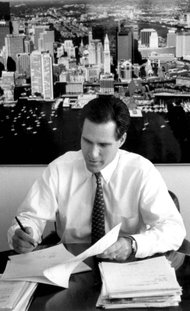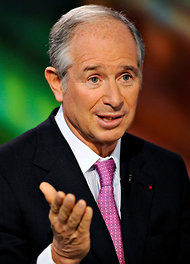 David L. Ryan/The Boston GlobeMitt Romney at Bain Capital in 1993. Mr. Romney has largely avoided getting into the details of the private equity business.
David L. Ryan/The Boston GlobeMitt Romney at Bain Capital in 1993. Mr. Romney has largely avoided getting into the details of the private equity business.
On Wednesday, Mitt Romney, the Republican candidate for president, will attend fund-raisers in Manhattan given by his former private equity peers and Wall Street bankers, putting the spotlight on the private equity industry and Mr. Romney’s role in it.
Mr. Romney, a co-founder of Bain Capital, will spend time at the sprawling Park Avenue apartment of his former rival and sometime deal partner, Stephen A. Schwarzman, the co-founder of the Blackstone Group. He will also be toasted at the Waldorf Astoria by James B. Lee Jr., vice chairman of JPMorgan Chase, who helped orchestrate many of the private equity industry’s biggest deals, along with a smattering of other senior executives from the bank.
(Jamie Dimon, the bank’s chief executive and a longtime Democrat, will not be among them; as a board member of the Federal Reserve Bank of New York, he is prohibited from raising money for political candidates, and it is still unclear which candidate he will support.)
DealBook Column
View all posts
While the fund-raisers are likely to generate many thousands of dollars and galvanize support among Mr. Romney’s former peers, they may also give an opening to critics like the Occupy Wall Street movement.
Already, Americans United for Change, a pro-union Democratic group, has begun a campaign comparing Mr. Romney to Gordon Gekko, the Michael Douglas character in “Wall Street.” It has even started a Web site, RomneyGekko.com.
The private equity industry’s titans have long been worried this moment would come — and about the effect Mr. Romney’s presidential campaign will have on the industry.
“If he is a nominee, well, hold your seats,” Henry Kravis, the co-founder of Kohlberg Kravis Roberts, told a room of executives at a dinner in Hong Kong last month, according to Reuters.
“They’re going to describe us all as asset strippers; we’re flippers of assets, we just put on a lot of debt, fire a lot of people and that’s how we make money,” he added. “You know that’s not the case. That’s absolutely not what we do.”
“There is no doubt that the Obama administration will clearly come out after Mitt Romney and the whole private equity industry,” Mr. Kravis said. “Mitt Romney may become the single source of all U.S. unemployment by the time the election happens.”
 Peter Foley/Bloomberg NewsStephen A. Schwarzman, a Blackstone Group co-founder.
Peter Foley/Bloomberg NewsStephen A. Schwarzman, a Blackstone Group co-founder.
A looming issue for the private equity industry is the tax treatment of what is known as carried interest. Private equity executives pay only the capital gains rate — 15 percent — on most of their income instead of the ordinary income rate, which in their case would typically be 35 percent.
So far, however, Mr. Romney has managed to dodge most efforts to brand him as a true Gordon Gekko. And the private equity industry has managed to avoid becoming the focal point of criticism, which instead has been directed at the Wall Street banks.
The crucial question is whether that will change as the campaign becomes more heated. Already, Republican rivals like Newt Gingrich are seizing on his track record at Bain Capital. On Monday, Mr. Gingrich suggested that Mr. Romney “give back all the money he earned from bankrupting companies and laying off employees over his years at Bain.”
But Mr. Romney appears to have kept a studied distance from the most current Gilded Age. A profile of Mr. Romney in The New York Times on Sunday about his relationship with money described a penny-pinching cheapskate who enjoyed flying on JetBlue and frowned upon ostentatious displays of wealth — hardly the lavish spending habits of some of private equity’s current kingpins. (Mr. Romney does, however, have a soft spot for real estate.)
In truth, while Mr. Romney may be worth several hundred million dollars, he is a pauper next to the founders of the biggest firms since he left the industry in 1999, well before the bubble of the next decade that produced billion-dollar riches.
Mr. Romney’s opponents, of course, have combed through his former deals at Bain looking for tales of excesses and failure. Perhaps the worst deal he worked on — which has been highlighted by several news organizations — was the buyout of Dade International, a medical company, which filed for bankruptcy after Bain had cashed out with $242 million.
But criticism about the Dade deal has not stuck as a true talking point, in part because the details painted a complicated story.
Dade was on the verge of bankruptcy when Bain originally bought the company. While Mr. Romney made cuts at the company, he also invested heavily, turning it into the industry leader. At one point, he pushed back against colleagues who wanted to flip the business for a quick profit and instead directed them to make an acquisition to bolster it.
It was only after Dade had been turned around that Bain and the company’s other investors leveraged the company up even more and paid themselves a huge dividend, saddling the company with too much debt.
Some critics contend that private equity firms are skilled at cutting costs at businesses but can choke off growth with large amounts of debt. In the context of the government’s budget, Mr. Romney’s embrace of streamlining may just be what’s in order, but it still poses political challenges.
Mr. Romney’s former colleagues are quietly waiting to see whether he will try to leverage — pun very much intended — his role at Bain in his campaign or will continue to shy away from it.
While Mr. Romney often invokes his broad experience at Bain, he has typically avoided getting into the details of the private equity business, seemingly to avoid the negative connotation that the industry has for some Americans.
But given the clear bipartisan sense that the United States government is marred by inefficiency and is in need of a turnaround, it will be interesting to see whether he tries to highlight the details of his private equity work as a way to demonstrate how he would run the country.
In 2007, Mr. Romney famously said of his private equity work that “sometimes the medicine is a little bitter, but it is necessary to save the life of the patient.”
Some critics have taken that quotation to suggest he is a heartless mercenary. Others have said that the nation may need a dose of the same kind of medicine.
How well Mr. Romney manages those perceptions may determine whether private equity makes it into the White House.
Article source: http://feeds.nytimes.com/click.phdo?i=37321413d89521662cf5f35353e51e59

Speak Your Mind
You must be logged in to post a comment.